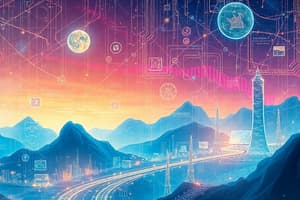Podcast
Questions and Answers
What role does information and communication technology play in the digital economy?
What role does information and communication technology play in the digital economy?
It serves as the backbone, enabling the transformation of economic activities into digitalized processes.
Explain how personalization impacts user experience in the digital economy.
Explain how personalization impacts user experience in the digital economy.
Personalization enhances user experience by tailoring services and navigating systems according to individual needs.
Describe the significance of mobility in the context of the digital economy.
Describe the significance of mobility in the context of the digital economy.
Mobility allows users to operate digital devices anywhere, making the economy flexible and highly responsive to demands.
What is the network effect, and why is it important in the digital economy?
What is the network effect, and why is it important in the digital economy?
How do electronic devices contribute to the advancements in the digital economy?
How do electronic devices contribute to the advancements in the digital economy?
How has the internet facilitated the rise of e-commerce?
How has the internet facilitated the rise of e-commerce?
What role does artificial intelligence play in current technological transformations?
What role does artificial intelligence play in current technological transformations?
What are some environmental concerns associated with cloud computing?
What are some environmental concerns associated with cloud computing?
In what ways has digital governance improved the delivery of government services?
In what ways has digital governance improved the delivery of government services?
What are the privacy issues associated with the increasing digitalization of everyday life?
What are the privacy issues associated with the increasing digitalization of everyday life?
Flashcards
Digital Economy
Digital Economy
The transformation of economic activity to be more reliant on the internet and digital systems, replacing traditional methods.
Connectivity
Connectivity
The ability of the internet to connect people, businesses, and governments.
Mobility
Mobility
How easily digital devices and services can be accessed from anywhere.
Personalization
Personalization
Signup and view all the flashcards
Electronic Devices
Electronic Devices
Signup and view all the flashcards
Internet Innovations
Internet Innovations
Signup and view all the flashcards
E-commerce Impact
E-commerce Impact
Signup and view all the flashcards
Social Media's Role
Social Media's Role
Signup and view all the flashcards
AI Transformations
AI Transformations
Signup and view all the flashcards
Cloud Computing's Impact
Cloud Computing's Impact
Signup and view all the flashcards
Study Notes
Digital Economy
- A digital economy transforms everyday economic activities, becoming increasingly dependent on the internet.
- Online systems now replace traditional brick-and-mortar establishments.
- Information and communication technology (ICT) is the backbone of a digitalized economy, fueled by hyperconnectivity.
- The internet is the most important part of this economy.
Digital Economy Meaning
- Economic activities are becoming digitalized via the internet.
- The internet links economic activities to a digitized form.
Digital Economy Changes
- The digital economy extends beyond just commercial transactions; it encompasses widespread digital transformations across many sectors.
- It affects the job market, governance, manufacturing, and various services (education, healthcare, etc.).
Characteristics of Digital Economy
- Personalization: Personalized experiences tailored to individual needs, enhancing user experience through greater navigability and accessibility.
- Connectivity: The internet and communication systems connect various stakeholders (people, businesses, governments), broadening the connectivity factor.
- Mobility: Digital devices allow for flexible and responsive operation anywhere data is available.
- Free content: Access to nearly all online content is often provided in exchange for something (e.g., advertisements).
Components of Digital Economy
- Electronic devices: Digital innovations enhance devices (phones, TVs, vehicles, watches) through features like internet connectivity, AI, and IoT.
- Internet: The internet is a disruptive innovation paving the way for other digital advancements like cloud computing, video conferencing, etc.
E-commerce
- A major online activity, e-commerce enables buying and selling (big and small businesses) across the world.
- Examples include Amazon, Flipkart, Myntra, Jabong.
Social Media
- Social media is a vital part of the digital economy, primarily as communication media and an aid to e-commerce.
Artificial Intelligence (AI)
- AI is causing major transformations in many fields, with current examples including driverless vehicles and smartwatches measuring health data.
Cloud Computing
- Cloud computing provides online storage for various data (documents, passwords, payments) and eliminates the need for physical storage devices.
- However, cloud computing raises concerns about the environment and security.
Impact of Digital Economy
- Digital technology and the internet pervasively influence the daily lives of people.
- Traditional systems are being digitalized.
- Mobile phones, televisions, and even homes/vehicles are becoming more interconnected and smart.
Impact of Digitalization Specialization
- Digitalization affects healthcare (smartwatches, pacemakers) and education.
Pros of Digital Economy
- Time-saving: Real-time response and faster systems.
- Cost-effectiveness: Reduced travel costs and more choices for customers.
- Flexibility and Accessibility: 24/7 service availability.
Cons of Digital Economy
- Privacy and security concerns: Issues related to data protection.
- Fraud: Higher risk of online fraudulent activities.
- Technology over-dependence: Possible negative effects from excessive technology use.
Digital Economy vs Traditional Economy
- Goods and Services: Digital economy facilitates online purchase and availment, in contrast to traditional physical stores.
- Payment Methods: Digital economies favor cashless transactions and crypto, while traditional economies primarily rely on currency.
- Workforce and Automation: Traditional models heavily depend on human labor, in contrast to digital models' increasing mechanization and automation.
- Assets and Storage: Digital and physical assets are both significant, however, online digital assets are widely used and stored.
Studying That Suits You
Use AI to generate personalized quizzes and flashcards to suit your learning preferences.




